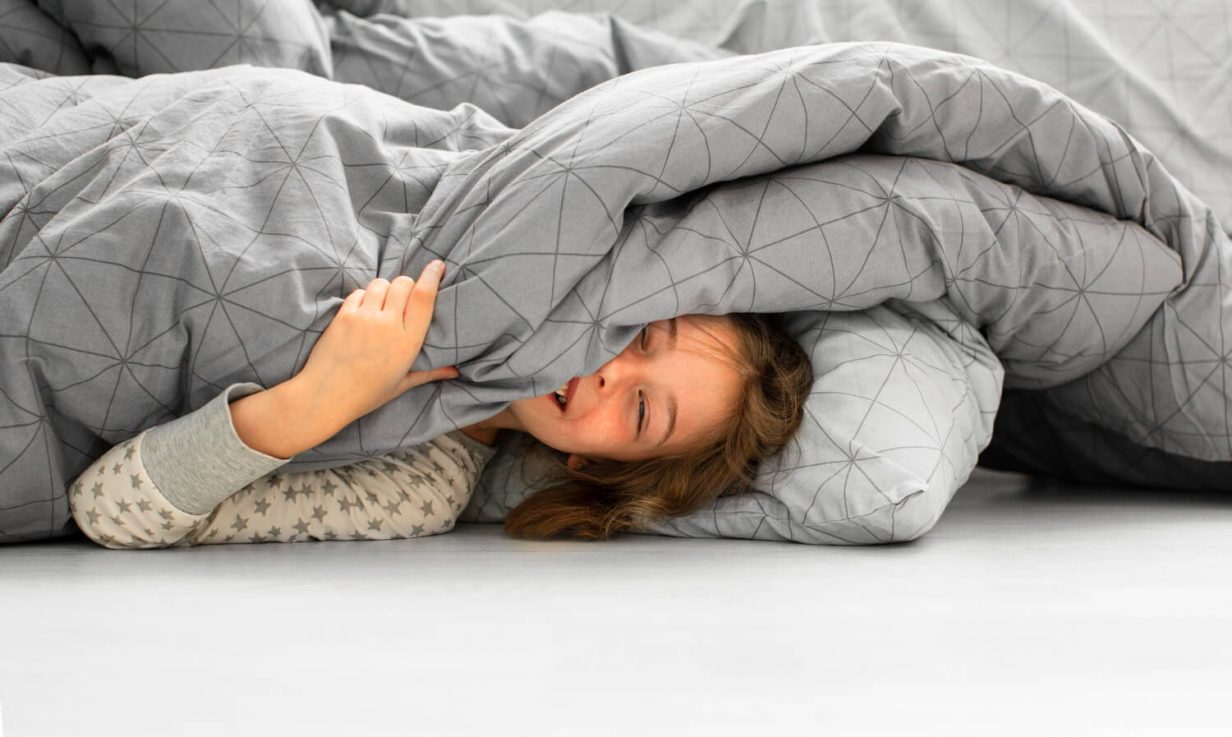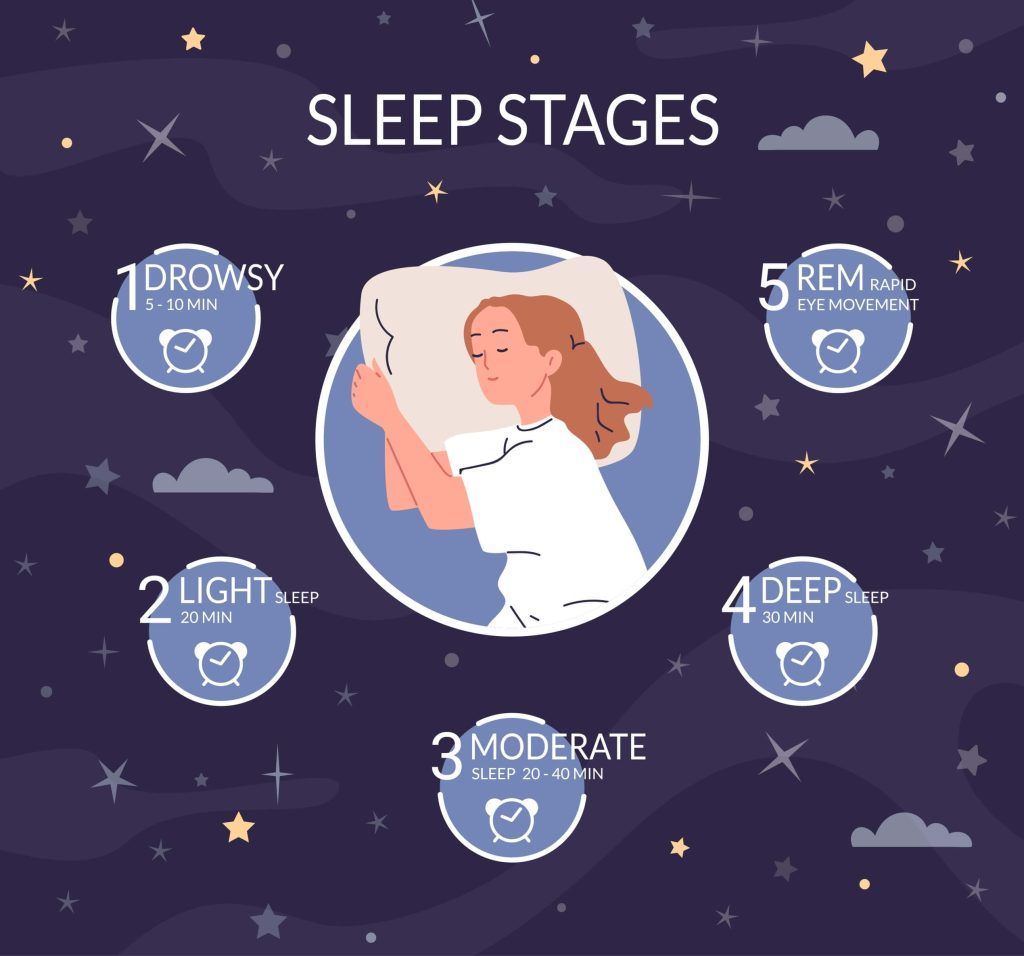How to Wake Someone Up Who Is a Heavy Sleeper: Parents’ Edition

Let’s face it, as kids get older, it can be harder and harder to get them out of bed. By the time your child is a teen, the days of being woken by your little one at 5 am will likely be a distant memory. But with school and other commitments, getting your kid up and out the door can feel like a real challenge. Wondering how to wake someone up who is a heavy sleeper? Keep reading for everything you need to know.
Contents:
- The 5 Stages of Sleep and What They Do
- Why Some Kids and Teens Are Heavy Sleepers
- How to Wake Up a Heavy Sleeper
- When to Seek Professional Help
- Morning Routine Checklist for Families
- FAQs
The 5 Stages of Sleep and What They Do

StockSmartStart/Shutterstock
To understand why some kids sleep like a rock, it helps to know what’s actually happening in the brain at night. Every person cycles through several sleep stages, and some of them make waking up almost impossible—even with loud alarms or a parent gently shaking their shoulder.
Stage One
The brain begins to produce alpha and theta waves as eye movements reduce. This phase of light sleep can last up to around seven minutes, and kids are still relatively easy to wake up here.
Stage Two
Though still in a light (non-REM) sleep, there is a sharp increase in sleep spindles in the brain during this stage, which will subsequently slow down.
Most morning wake-ups happen during this stage.
Stages Three and Four
The person is now starting to go into a deep sleep, with the brain producing delta waves, meaning the sleeper is less likely to suddenly wake up from loud noises or other environmental stimuli.
Kids in this stage are the hardest to wake—even loud alarms or shaking may not work. Many heavy sleepers simply spend more time in these deep-sleep phases.
Stage Five
Around 90 minutes after entering a light sleep, the body goes into REM sleep. This type of rapid eye movement sleep stage lasts up to an hour, and this is when brain activity is at its highest. Dreams take place during REM sleep, and most adults have five to six rapid eye movement sleep cycles every night.
Kids may twitch or mumble, but they’re still surprisingly hard to wake during REM, because the brain is “busy” processing memories and emotions.
Why Some Kids and Teens Are Heavy Sleepers
Deep sleepers may be able to slumber through loud noises and the blare of an alarm clock—even if it’s right next to them. But what makes some kids and teens such heavy sleepers? There are likely to be a few factors at play.
A lack of a healthy sleep pattern can cause havoc. Kids and teens who stay up late—maybe scrolling on their phones or gaming—could be sleep deprived. They’re in a deep sleep in the morning as they haven’t had enough sleep at night. Lack of sleep can cause all sorts of problems, including poor thinking skills, low mood, low energy levels, and can even hamper development. Helping your child practice good sleep hygiene is key—even if this means banning screens after a certain time in the evening.
Poor sleep habits can also negatively impact the body’s internal clock, making it harder for kids to fall asleep at night and wake up in the morning. Establishing a healthy nighttime and morning routine can help with this, and we’ll talk about this more below.
Sometimes, health conditions, sleep disorders, or certain medications are the reason a child or teen is a deep sleeper. Sleep apnea, for example, causes the breathing to stop and start while the sufferer is asleep. This impacts sleep stages, often causing broken rest and preventing quality sleep. If you think there’s an underlying cause responsible for your child’s deep sleep, be sure to talk to your healthcare provider as soon as possible.
Sleep inertia can complicate matters. This protective mechanism is designed to help an individual maintain sleep even when they’re woken abruptly. Sleep inertia is characterized by feelings of grogginess, disorientation, and drowsiness as soon as the person is woken up, and can last for up to an hour, if not longer. If you’re teen suffers from sleep inertia, it’s best to wake them up gradually, to decrease these sensations and help them pass more quickly.
There’s another reason that teens turn into heavy sleepers, particularly in the morning. During adolescence, teens experience a shift in their natural circadian rhythms, which affect when we feel sleepy and wakeful, and sleep stages. As a result, teens often don’t feel sleepy until later in the evening—meaning they’re simply not tired enough to fall asleep as early as they used to.
How to Wake Up a Heavy Sleeper

Kitreel/Shutterstock
First of all, an easy wake-up starts the night before with proper preparation for sleep.
Create an Environment That Supports Morning Wake-Ups
So, now we’ve looked at some possible reasons your child or teen is a deep sleeper–making for wake-up challenges in the morning—let’s take a look at how to create an environment that’ll help your child fall asleep faster, ready for a good morning ahead.
- Maintain a consistent bedtime and wake-up time, even on weekends. This will promote a healthy sleep cycle and make it easier for your child to consistently fall asleep.
- Limit screen use in the evening. The blue light emitted by screens disrupts the brain’s production of the sleep-facilitating hormone melatonin, which can make both drifting off to sleep and staying asleep more difficult. To avoid this, make sure your child switches off their screen at least an hour before bedtime.
- Lighting is your friend. Dim lights in the evening can help kids wind down, ready to sleep, while natural light can act as a gentle wake-up call.
- A dark, quiet, cool bedroom environment is best for sleeping… and therefore makes for an easier morning wake-up. For light sleepers, especially, removing distractions or things that make a noise (such as a phone pinging whenever a message is received) is helpful.
- Consider using kid-friendly essential oils that promote sleep as a room or pillow mist.
- Kids (and adults, too) should avoid consuming caffeine or a large meal too close to bedtime—both can make it harder to fall into a deep sleep, and make a disturbed night more likely.
Alarm and Wake-Up Strategies That Work
When it comes to waking a deep sleeper, you need effective strategies that’ll work. Heavy sleepers, or those with sleep inertia, may sleep through their alarm clock or repeatedly hit the snooze button before going back into a deep sleep. Rather than a quiet or distant alarm sound, you may need to deploy a much louder alarm clock noise that your deep sleeper can’t ignore. If a standard alarm clock tone isn’t cutting it, musical sounds might be more effective. In terms of alarm noises, a study of musical sounds found that a song that the sleeping person enjoys may be most effective at getting heavy sleepers to wake up.
While a glass of ice water over the head may be a tempting way to wake someone who is constantly sleeping through their alarm clock, gradual methods such as gentle touches, speaking in a soothing voice, and allowing natural light into the room are effective strategies to get a family member out of bed. The first rays of morning light filtering into the room can be a gentle way to wake someone—unlike that glass of cold water. An enticing breakfast scent (such as the smell of delicious cinnamon rolls or bacon frying) may also work wonders for heavy sleepers.
To stop heavy sleepers from falling back to sleep once woken, mental stimulation is the key to getting them to feel alert and ready for the day. Doing a crossword puzzle in bed or reading a few pages of a book upon waking are effective techniques to stay awake.
Read more: How to Wake Someone Up (Especially Kids and Teens).
Use Technology Wisely — How Parents Can Get Help
Natural light and a gentle nudge aren’t the only weapons in your arsenal when it comes to how to wake up your heavy-sleeping teen. Get tech on your side with these tips on how to improve teens’ sleep patterns and general well-being, and make the morning wake-up a breeze.
- Use smart lightbulbs to dim the lights as bedtime approaches and gradually turn them back on when it’s time to wake up.
- Consider turning off your Wi-Fi an hour before your teen’s bedtime to help keep night owls off their screens. This also means that lighter sleepers who wake in the night won’t be tempted to reach for their phones.
- Setting a smart alarm can be a great way to wake up even heavy sleepers. You could set the alarm to play soothing sounds or your teen’s favorite song. Set the alarm to manual shut-off only, so your kid has to actually get out of bed to turn it off.
- Try some loud alarm apps as a way to wake a heavy sleeping teen. There’s a vast array available. Some incorporate customizable alarms and even mental challenges to help your teen wake up and raise their energy levels.
- If you use the Findmykids app, activate the Loud Signal to wake someone. Even really heavy sleepers won’t be able to ignore it…and it works even if your teen has set their phone to silent!
And beyond wake-ups, Findmykids gives parents a fuller picture of their child’s day—from location safety to battery tracking and helpful daily check-ins. If you’re looking for a simple way to ease stress and stay connected with your teen, the app can become a genuinely useful part of your family routine!
Avoid These Mistakes That Make Heavy Sleepers Worse
One method you definitely don’t want to try to wake up heavy sleepers—as we mentioned above—is splashing them with cold water from a safe distance. Abrupt wakeups could cause a spike in adrenaline and blood pressure, and are definitely not the ideal way to start a day! The best way to wake someone from sleep is as gently as possible, avoiding sudden movements and loud noises.
Not getting your child to follow consistent sleep patterns will also impact their ability to wake up in the morning, and mean they’re not getting the same amount of sleep every night. A bedroom that’s too hot, an uncomfortable bed, or a bedroom door left open and letting in noise are all easy to remedy mistakes.
When to Seek Professional Help
If you’re worried about how heavily your child is sleeping or how difficult it is to wake them up in the morning, it’s important to speak to your healthcare practitioner, who will check for sleep disorders or other medical conditions that could be causing the problem. If unusual sleep patterns are accompanied by a fever or behavioral changes—or if it’s really difficult to wake your child up and keep them awake—it’s vital to seek medical attention urgently.
Morning Routine Checklist for Families
You may be a family of heavy sleepers who all struggle to wake up, or a flock of larks, who spring out of bed in the morning, or maybe a mix of both. What’s certain is the importance of a morning checklist to ensure a smooth wake-up is followed by a smooth morning routine.
- Have a clear wake-up time for all family members that ensures everyone can get to school and work on time.
- Assign age-appropriate morning chores to help get everything done.
- Prep as much as possible the night before, such as packing school bags and making packed lunches—get kids to help with this where possible.
- Make breakfast ahead of time, too—consider stocking your freezer with ready-made breakfast options that can simply be popped into the toaster or oven when you wake up.
- Implement boundaries around tech—perhaps have a “tech ban” for the first hour in the morning after waking up to ensure morning tasks are completed without distraction.
The Best Way to Wake Heavy Sleepers for Happier Mornings
If you’re wondering how to wake someone who is a heavy sleeper, you’ll find plenty of ideas in the guide above. The key thing to remember is that an easier wake-up starts the night before. By helping ensure your child is following healthy sleeping habits and getting the rest they need, you might well find that getting them out of bed isn’t a struggle at all. Or not much of one, anyway.
FAQs
How to wake up a person from deep sleep?
If someone is in a deep sleep, it’s best to wake them gently and gradually. This could be through, for example, speaking soothingly or gently touching them. If possible, try to wake someone without using sudden movements or loud noises.
What to do if someone is asleep and won’t wake up?
If someone is asleep and won’t wake up no matter what you do, then this should be treated as a medical emergency.
How to wake someone who is sleepwalking?
To wake up someone who is sleepwalking, it’s advisable to guide them gently back to bed and, if necessary, use a loud noise to wake them from a safe distance. Stay with the person and reassure them until they feel safe.
What is the 10 3 2 1 rule for sleep?
The 10 3 2 1 rule for sleep aims to improve sleep quality. It involves not consuming caffeine at least ten hours before sleep, avoiding large meals and heavy drinks at least three hours before sleep, limiting screen time to two hours before bed, and enjoying relaxing activities, such as having a bath or reading, just before settling down to sleep.
Cover image: freepik/Freepik
Проверьте электронный ящик




















